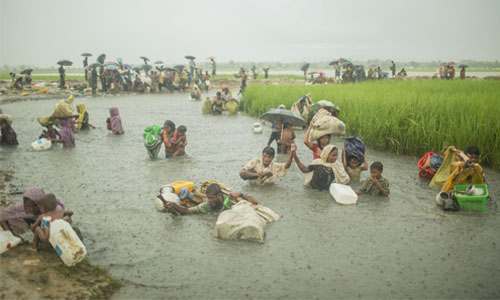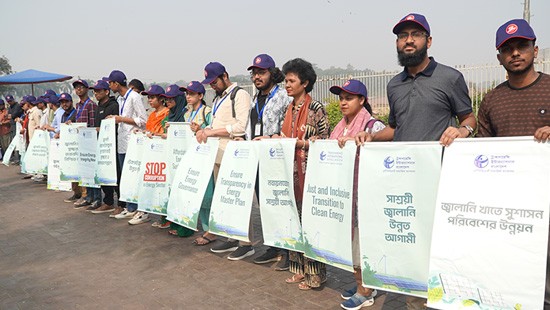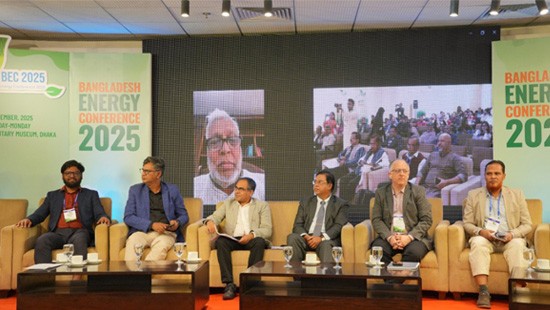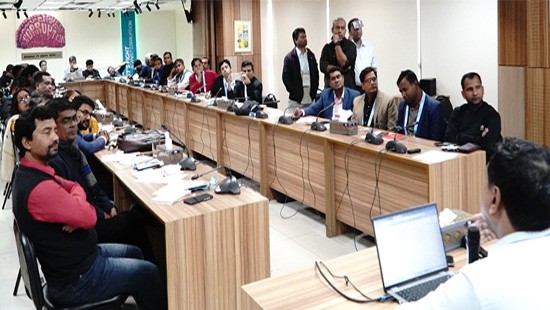Published: 05 December 2019
The current management framework of Rohingya humanitarian assistance program is severely plagued with various challenges, including lack of coordination among implementing agencies, inter-communication, financial inconsistencies, monitoring, and prolonged stay of Rohingyas. Also, the lacks of adequate human resources and information disclosure with absence of a central database, caused lack of transparency and have been disrupting the management and supervision activities of the refugee camps widely. In addition, emergence of beneficiary groups at different levels of the humanitarian program poses grave risks of institutionalization of corruption and irregularities.
A Transparency International Bangladesh (TIB) study titled Forcibly Displaced Myanmar Nationals (Rohingya) in Bangladesh: Governance Challenges and Way out revealed the worrisome observations. The study, conducted between July and October 2019, to identify the governance challenges in the management of Rohingya nationals, was unveiled at a press conference organized by TIB at its central office on 5 December.

At the press conference, TIB expressed grave concern on decreasing sectoral humanitarian assistance and absence of specific initiatives to proceed with the repatriation effort by the international community that would eventually increase the financial risk and pressure on the economy of Bangladesh. Such delay in repatriation has been causing heavy toll on the local population posing various risks with regards to security, unemployment, high price of commodities etc. "It's evident from the study that economic, social and environmental risks (for the local population) have increased," said TIB Executive Director Dr. Iftekharuzzaman at the press conference.
Md. Shahnur Rahman and Nazmul Huda Mina, Programme Manager and Assistant Programme Manager of Research and Policy (R&P) division of TIB presented the report findings at the press conference. Among others, Professor Dr. Sumaiya Khair, Adviser -Executive Management; Mohammad Rafiqul Hassan, Director –R&P; Shahzada M. Akram, Senior Programme Manager, R&P of TIB were also present at the programme.
The study identified implementation of series of initiatives by the concerned authorities as per recommendations of TIB rapid assessment on the management of the Rohingya exodus in 2017. However, the study found that coordination gap and replication of activities between government and non-government stakeholders engaged in Rohingya management had existed which resulted in allegations of delay in the process of getting project approval, work permission, project completion certificate, and assessment of relief. Besides, the study found that obligation of the NGOs to follow a special process (FD-7) in receiving project grants for the humanitarian assistance under the supervision of the NGO Affairs Bureau were not properly maintained as several allegations of corruption and irregularities in the use of such grants were observed.
In addition, the government has no controlling and accountability structure for the UN agencies and their implementing partners. For example, the mandatory obligation of 25% allocation of the grants for the host community was not maintained, and also there is no guideline or structure on how to follow this rule. In addition, some of the international organizations are accused of spending higher amount for administrative functions than for programs. According to the information provided to TIB by some UN bodies, during 2017-2019, the UN Women spent the highest (32.6 percent) for its operation while the Unicef had the lowest operation cost, 3 percent. “This cost also includes the administrative cost of the NGOs that are funded by the UN bodies. Therefore, it is really difficult to say the exact administrative cost of the UN bodies. We believe it to be much higher,” said Dr. Zaman.
Dr. Zaman recommended a stronger coordination among the government bodies, UN agencies, and NGOs to check the financial anomalies and duplication of work. The aid agencies should make public their information on the projects, fund, and expenditure, and it is important that the UN and other NGOs make their information pubic on the spending over the Rohingya crisis, Dr. Zaman said.
According to the study, from 2017 to 2019, the full amount against the need of humanitarian assistance for Rohingyas has not been assured; and the amounts received against the need in 2017, 2018 and 2019 (till October) were 73%, 69% and 55% respectively. In consequence, different sector-based funds especially for food and nutrition, health, education, shelter, safety and security, water supply and sanitation services were inadequate and thus the required services were disrupted. Dr. Iftekharuzzaman said, “Despite the welcome from both national and the international community for providing shelter to Rohingyas, Bangladesh has been facing multi-faceted social, environmental and security risks along with financial burden. Various sources show that the Bangladesh government has so far disbursed Tk 23.08 billion (from 2017 to 2019) from own fund in addressing the crisis. The fund from the international community for nearly one million Rohingyas may not sustain as no strong international initiative has been taken to oblige Myanmar for creating a conducive environment for the refugees to return soon. As a result, Bangladesh’s socio-economic instability will grow. There are risks of security at local and national levels. The crisis also creates political and diplomatic challenges for the government.”

The study found several allegations against some officials in the offices of Cox’s Bazar and Bandarban deputy commissioners of delay in project approval for at least 7 to 15 days and in some cases for more than a month. Also, in some case, NGOs have to make unauthorised payments of BDT 20,000 to 50,000 and BDT 50,000 to 70,000 respectively to some officials in the upazila and district administration offices to collect the completion certificate for each project, found the study. Members of some committees formed by the local DCs also extort BDT 2,500 to 3,000 from each relief-carrying truck in the name of checking the quality and quantity of the relief materials, officials said. Any organisation not agreeing to pay the money experiences a delay of 5 to 15 days to get the clearance, while the organisations that pay the bribe usually get the relief checked fast. The study also found that a section of camp in-charges are allegedly extorting BDT 2,000 to 5,000 for supervising each program implemented by the NGOs. Some local, national, and international NGOs are allegedly using poor-quality materials in their works such as building shelters, establishing sanitary latrines, setting up learning centres and in community mobilization, the study identified. They extract the money by flouting programme designs and through irregularities and collusive corruption in association with contractors in procurement process, it was further alleged.
According to the study, the security situation in camp deteriorates during night. Out of 32 camps, there are no security personnel under CIC except in two registered camps. The lack of security, protection and stability in Myanmar and the uncertainty of relocation in Bangladesh created_at psychological trauma, violent attitudes and criminal tendency among Rohingyas. This resulted in the rise of crimes including murder, kidnapping, rape and drug trafficking. Seven terrorist groups are allegedly active in various camps.
Analyzing the report, Dr. Iftekharuzzaman said: “We fear that the nearly 1 million Rohingyas sheltering at different refugee’s camps may stay for a long time. Despite such a circumstance, the government is not making any long term plan, which is a must. Bangladesh must estimate short-term, middle-term, and long-term requirements through analyzing multi-faceted potential impact of the problem engaging all stakeholders in the process. And to ensure adequate resources and capabilities based on the estimation, it should increase diplomatic initiatives in both national and international arenas.”
Stating that humanitarian assistance programme across the globe creates governance challenges, Dr. Zaman said, "such activities are like a growing industry. That is why the preparation of atrocities such as ethnic cleansing and genocide, could not be prevented even after taking place before the eyes of the United Nations and the international community. Rather, after the atrocities end, everyone seems to become logically active in the humanitarian aid program. The Rohingya crisis is no exception. It is absurd to assume that information on the preparation of a brutal operation on the Rohingya was unknown to the international community, especially the United Nations. Therefore, those who are truly seeking justice in the international court, should not only charge those who are responsible for this ethnic cleansing, but also the alleged accomplices who ignored the prior information of the incident and failed to initiate any preventive measures.”
“This is a direct burden. Indirect burden is much more and it will continue to increase. Bangladesh had sheltered the Rohingyas on humanitarian ground, but the problem is lingering due to some influential countries and the international community, which have not done enough to oblige Myanmar to solve the crisis. The government of Bangladesh has been pursuing diplomatic efforts to accommodate the Rohingyas. However, Myanmar is determined to continue creating hurdle in the Rohingya retreat with the strategic support of powerful countries like India, China and Japan. So it is not the diplomatic failure of the government, but the diplomatic constraints," Dr. Zaman concluded.
Including spearheading strong diplomatic initiatives with various states, UN, international organizations and donor agencies to expedite the repatriation process of Rohingyas, the study suggested a total of thirteen ways to ensure transparency and accountability in coordination and management of the humanitarian programmes. The notable among the recommendations included, among others, enhancing coordination and capacity among the stakeholders; engaging the concerned stakeholders in the verification of relief materials; increased security workforce; a working strategy for adopting specific programs involving the local people and implementation; a structured vigorous ‘Complaint Redress System’ to address grievances related to humanitarian assistance activities and project implementation; elected Rohingya representatives in camps.






